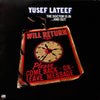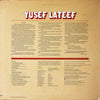



Yusef Lateef - The Doctor Is In...And Out
ORDER LIMITED TO ONE ITEM PER CUSTOMER
Yusef Lateef - Alto Saxophone, Tenor Saxophone, Flute, Oboe, Flute (bamboo) [click here to see more vinyl featuring Yusef Lateef]
Ron Carter (Bass)
Jimmy Buffington (French Horn), Billy Butler (Guitar), Anthony Jackson, Robert Cunningham, Kenneth Barron (Keyboards), Al Foster (Drums), Dom Um Romao (percussion), Dana McCurdy (Synthesizer), Jack Jeffers (Trombone), Joseph Wilder, Leonard Goines (Trumpet), Jonathan Dorn (Tuba).
Arranged & Composed by Kenneth Barron (tracks: A2, A3, B2), Yusef Lateef (tracks: A1, B1, B3, B4)
1 LP, standard sleeve
Limited edition
Original analog Master tape : YES
Heavy Press : 180g
Record color : black
Speed : 33 RPM
Size : 12'’
Stereo
Studio
Record Press : Unspecified
Label : Pure Pleasure Records
Original Label : Atlantic
Recorded at Regent Sound Studios, New York by Bob Liftin in March 1976
Produced by Joel Dorn
Re-mastering by: Ray Staff at Air Mastering, Lyndhurst Hall, London
Originally released in 1976
Reissued June 2016
Tracks :
Side A :
1. The Improvisers
2. Hellbound
3. Mystique
Reviews :
« In 1976, Yusef Lateef's as restless a spiritual seeker as there ever was in the field of music, revisited some of his earliest themes in the context of modern sonic frameworks: The Eastern modal and melodic frameworks of his Prestige sides, such as Eastern Sounds, Cry!/Tender, and Other Sounds, brought to bear in much more sophisticated, complex, and grooved-out ways -- after all, it had been 20 years or more. The groove referred to is funk and soul. Funk itself was mutating at the time, so Lateef's interpolation at the crossroads of all ports in the musical journey was not only valid in 1976, but also necessary. For this recording, he utilized an absolutely huge group of musicians, bringing them in for this or that part, or a sound, or a particular vamp. Some of those present were Kenny Barron, Ron Carter, Dom Um Romao, Al Foster, Billy Butler, Anthony Jackson, a five-piece brass section, and a synth player. Lateef, as always, was offering evocative glimpses of geographical, psychological, spiritual, and emotional terrain in his compositions, but not in predictable ways. There's the deep minor-key meditation on blues and evolving thematic variations on "Hellbound" that becomes a Latin funk tune; the airy, contemplative, and skeletal "Mystique," which may use a repeating rhythmic phrase but explores every inch of its margins via a string section and Lateef's flute solo; the smooth, urban, bluesy funk of "Mississippi Mud"; the completely out electronic musique concrète of "Technological Homosapien" that becomes a series of synth squeals and an erratically tumbling bassline; and the wonderfully warped mariachi variation (sung in white-boy English) that featured the band playing bluesy hard bop over an age-old recorded track on "In a Little Spanish Town." It's a weird way to end a record, but then, it's a weird and wonderful record. » AllMusic Review by Thom Jurek
"Lateef's first decade of recording, from 1957 to 1966, was, however, undeniably top ranking. A gutsy tenor saxophonist and soulful flautist, he was an early adopter of modal frameworks, and, beginning in 1957 with his Savoy album Jazz Moods, he was also a pioneer of the use of Middle Eastern and South Asian instruments and harmolodic motifs in jazz. The culturally outward-looking Savoy and Prestige discs, recorded between 1957 and 1961, were well ahead of the curve and Lateef developed the experiments further on Impulse! later in the decade. On the downside, however, the Prestiges often veered uncomfortably close to easy listening. Indeed, the label originally released some of them—including the totemic Eastern Sounds—on its Moodsville and New Jazz subsidiaries, which Prestige founder and producer Bob Weinstock had set up to tap into the wallpaperish "mood music" market, at its peak in the late 1950s and early 1960s." Chris May, All About Jazz July 2018
"In 1976, Yusef Lateef's as restless a spiritual seeker as there ever was in the field of music, revisited some of his earliest themes in the context of modern sonic frameworks: The Eastern modal and melodic frameworks of his Prestige sides, such as Eastern Sounds, Cry!/Tender, and Other Sounds, brought to bear in much more sophisticated, complex, and grooved-out ways -- after all, it had been 20 years or more. The groove referred to is funk and soul. Funk itself was mutating at the time, so Lateef's interpolation at the crossroads of all ports in the musical journey was not only valid in 1976, but also necessary.
For this recording, he utilized an absolutely huge group of musicians, bringing them in for this or that part, or a sound, or a particular vamp. Some of those present were Kenny Barron, Ron Carter, Dom Um Romao, Al Foster, Billy Butler, Anthony Jackson, a five-piece brass section, and a synth player. Lateef, as always, was offering evocative glimpses of geographical, psychological, spiritual, and emotional terrain in his compositions, but not in predictable ways.
There's the deep minor-key meditation on blues and evolving thematic variations on "Hellbound" that becomes a Latin funk tune; the airy, contemplative, and skeletal "Mystique," which may use a repeating rhythmic phrase but explores every inch of its margins via a string section and Lateef's flute solo; the smooth, urban, bluesy funk of "Mississippi Mud"; the completely out electronic musique of "Technological Homosapien" that becomes a series of synth squeals and an erratically tumbling bassline; and the wonderfully warped mariachi variation (sung in white-boy English) that featured the band playing bluesy hard bop over an age-old recorded track on "In a Little Spanish Town." It's a weird way to end a record, but then, it's a weird and wonderful record." Paul Rigby - September 2016
Ratings :
Allmusic : 4.5 / 5 ; Discogs : 4.54 / 5


